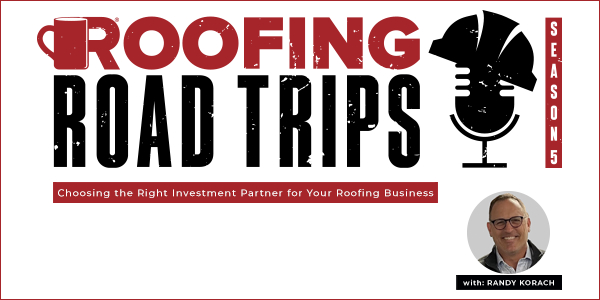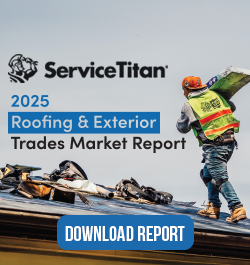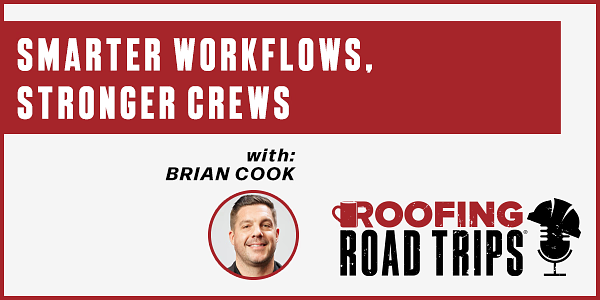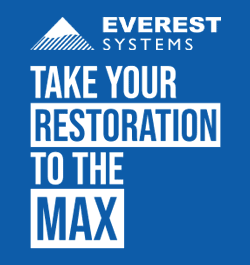Smarter Workflows, Stronger Crews - PODCAST TRANSCRIPT
May 22, 2025 at 12:00 p.m.Editor's note: The following is the transcript of a live interview with Brian Cook of Dataforma. You can read the interview below or listen to the podcast.
Intro: Welcome to Roofing Road Trips, the podcast that takes you on a thrilling journey across the world of roofing.
From fascinating interviews with roofing experts, to on-the-road adventures, we'll uncover the stories, innovations and challenges that shape the rooftops over our heads.
So fasten your seat belts and join us as we embark on this exciting Roofing Road Trip.
Karen Edwards: Hello and welcome to another episode of Roofing Road Trips from RoofersCoffeeShop.
My name is Karen Edwards and today I'm really excited to welcome Brian Cook from Dataforma. Brian, it's so great to see you.
Brian Cook: Yeah. It's nice to be an excited person that makes you excited as a guest.
Karen Edwards: Yeah and it's Friday, we're ready to go. And congrats to you, Brian.
You just had a new addition to your family, you mentioned to me before we hopped on here, a new daughter.
Brian Cook: Yep, yep. Baby girl number three, so that is the third daughter in four and a half years.
Karen Edwards: I love it. I love it. All right. Brian, for those who don't know, just introduce yourself. Tell everybody what you do at Dataforma and then a little bit about what Dataforma is.
Brian Cook: Yeah, so my name is Brian Cook. I guess my official title is a senior vice president.
At Dataforma, I've been there and I guess this is fairly uncommon now, but I've been at Dataforma for 18 or 19 years, I believe.
Karen Edwards: Wow, yeah.
Brian Cook: Yeah. We are a software company from the roofing industry and we work largely with commercial clients. We probably have 25% residential clients. We think we're the best software for managing the entire business. There's a lot of great softwares, especially more and more as things go on.
But if you want to track production and service and what roof systems do we install, that's really what Dataforma becomes. We're not just a little third-party application for one specific function. And it's really neat and I think you know, Karen. Karen and I are actually from the same area in Pennsylvania.
We came from a fairly large commercial roofing company, so Daryl Maronic was the vice president there. And I know and I always say we started Dataforma, even though I was like 19. But I was mowing the lawn at the shop when I was probably 13, sweeping up the shop all the way through high school.
Interned there during summers, college and worked there. And then when they created Dataforma, I was there and they said, "Hey, you're young, you know roofing and you know Dataforma and you never shut up. So why don't you go?" So yeah, we were born from that company, from the same frustrations that contractors still have.
There's generic programs and they're okay. There's the really expensive ERP systems and sometimes those are, they overpromise and underdeliver, but you still got to pay them. There's the Salesforces of the world, which are fantastic if you want to drop a million dollars a year.
So Dataforma was created to solve the issues of our company. And then the president, Tom Potager, saw it and said, "Oh my gosh, just go sell this." So that's how we were born, so it's a fun story. It's been unique over these, it's certainly not what I thought I was going to do when I was going to college.
Karen Edwards: Right, yeah. I think what's really cool about the roofing industry, is a lot of the best solutions were developed by contractors trying to solve a problem they had in their business, whether that's a tool, whether it's a piece of software.
So when someone is considering signing up for Dataforma, know that you've been there, right? You've experienced it.
Brian Cook: Yeah, you're so right. Because I meet with thousands of contractors, so they have my phone number, they're like, "Hey, Brian, what's the best estimating system?" I'm like, "Well, I know a couple of great ones, but also you showed me your Excel file and it's one of the coolest things I've ever seen."
And like you said, because you've been working on this from your experience for so many years, I don't know that you could replace it with another software. In fact, you could probably market your Excel estimating system to other people.
Karen Edwards: Right, right. Yeah. And Brian, you have been the face in the industry of Dataforma for most of those probably 19 years. I've seen Brian at every show.
You're involved in MRCA very heavily, so it's great to see the commitment that you have to helping those in the industry find success.
Brian Cook: Yeah. And I'm just thinking, "If I'm the face, no wonder we're not more popular."
Karen Edwards: Oh, stop.
Brian Cook: Yeah, it's great. It's true. A lot of our industry is amazing. I have a lot of people that try from my family and extended family that, "You should come sell software in New York to these hedge funds." I'm like, "I would not leave our industry for anything." You said MRCA, Bill Seibert. My mother was driving her sister across the country.
And I actually told her, "Good news is if you break down anywhere in Nebraska, I'm going to make one phone call and you're going to be picked up by a gentleman, taken out to eat. Your car's going to be fixed and you don't have to worry about a thing." Because that's the type of people that we have in our industry.
Karen Edwards: And she didn't break down, right?
Brian Cook: No, but I told her she probably should, because he'd take them to a nice dinner.
Karen Edwards: All right. Well, so one thing about being a technology company, first of all, that Dataforma has been around this long is a testament because software companies come and go. You guys were a pioneer when not a lot of contractors were using software and technology.
But I think one of the hardest parts about being a technology company is figuring out what to do next, where to take it next. So maybe you can talk a little bit about how you drive the innovation that you do there.
Brian Cook: Yeah. Yeah and it's true, because we had a vision of Dataforma and that lasted for probably three to four years. And then it was we gained enough customers and you're constantly getting feedback, so you realize like, "Oh my gosh, one, we never thought of that. So those are great ideas and suggestions that we should incorporate."
And then you also learn very quickly, "Oh, the world has changed in just those three to four years." And it also has this and it's a trite and used analogy, but it's real, the snowball effect. Back then we had 100 customers, now we have thousands. We have 15,000 active daily users and we get feedback from a lot of them.
So that little bit of feedback, we grow, we grow, we grow. And now it's gotten to the point that we're taking in feedback and we log every single call and every single email that we get, so we can sort through them and quarterly we go through. So that's what drove our growth, but then also we had the issue of we had to scale.
So I remember when we had one programmer, one person that sat there and wrote the code. Now, I think we have 18 and I don't know all their names and I feel bad. I'm in the weekly tech meetings, but it's like, "Oh, there's a new person and who's this person?" And we have people that just work on Apple apps, we have people that just work on Android apps.
Because again, when you've grown, like you said, 21 years of legacy code, there's a lot there that needs to constantly be rewritten and that's a lot of what we're doing now. The biggest feedback we get and it's honest. And I tell all of our customers, "I'm with you." Dataforma's old, so it's a little bit aesthetically not as pleasing as the others.
Karen Edwards: Got it.
Brian Cook: So that's a huge one. We're trying to make it look like it's a software in 2025 and not 1995.
Karen Edwards: Right. Yeah, yeah, yeah. Because you get used to it and you just keep doing it that way and you forget to freshen the brand and the look. Yeah.
Brian Cook: Well, yeah and it gets daunting. So again, if you're writing brand-new code, well, think about if you're redoing a house. If you're just building a house, sometimes it's easier than remodeling, because you got to tear out the old stuff. Retrofit it maybe with new regulations or things like that and then rebuild.
It's the same thing when you're writing code. It's like, "Okay. Well, this piece of code was written in a different language." But again, now that we have the manpower, these things are happening. You'll see a bunch of our screens are refreshed and every month there's a new one that's, "Okay, this has the new look."
One of the coolest things that I think our users are going to love here in another just few months, the whole mobile app interface is going to be redone. So each user will decide what's on their mobile app. And then it's going to have AI suggestions like, "Hey, Karen, did you know that you're next to this job? You're within 25 feet. Do you want to log into this job?"
So it's going to cue you to, "Hey, you should be logging into the job." Or, "Hey, you've left. You should probably log out of this job." Or normally this time of day, you create a daily field report or a safety check report. Do you want to do something like that?
So that's going to be an awesome one, because especially with the guys in the field, we want to make it simple. So it's just going to tell them, "Here's what you normally do."
Karen Edwards: Yeah, I like that. I just had that experience, I was traveling and I had taken an Uber and at the end it says, "Do you want to tip?" And it had a suggested tip based on my last few tips and I was like, "Well, that's exactly what I would've tipped." Yeah, boom, it was super easy. So yeah, recognizing that.
Come on, AI is incorporated in just about everything we're doing nowadays, whether you know it or not, so yeah, I love that you're doing that. I'm curious though, because you've made some of these updates, the interface, the interaction.
And sometimes people are like, "Wait, they changed it. I can't find, it's not the same." So how has that been with your users? And ultimately, are they like, "Oh, now I love it"?
Brian Cook: It's exactly what you would think. So when you change something, people hate it. And then because we log every call, you can actually watch the down cascading of, "Okay, we hate it, we hate it. Okay, it's okay. Okay, now we like it," after two to three months of using it.
But also it's good, because sometimes it's after three months, they're like, "We still hate it." It's like, "Okay. Well, I guess we're going to go back to the old way of doing it." Or sometimes, this is funny, when I do demos, we have two versions of our service scheduling calendar.
I hate the old one, but people have used it for so long. We have a couple of people that have used it for 20 years.
Karen Edwards: Wow.
Brian Cook: If we took that away and some of these people, we call them by their first name. And that person would fly to Texas and kill us for taking away that calendar. So what we do is we keep that calendar there and then we add the new one right next to it. So all of our new users use the new calendar, but those people, they can still have it.
So it's just a delicate balance of is it something we can keep and make available to them? Or like, "Hey, this one just has to go," knowing that if it really is bad, we're going to get rid of it. The other huge feedback and this was awesome. We had a couple big meetings last week with 15, 20 clients and it was pretty consistent.
We didn't go in looking for this, but I called our CEO after. I was like, "I've heard the same thing in every meeting." He's like, "Me too. Love the functionality, sometimes it's too many clicks to get there." And I was like, "Oh." So all we have to do, because again, we're not an out-of-the-box software.
We don't compete with Housecall Pro or something like that, that you just purchase and use. But we compete with the ERP on a functionality level, but if we can make it so it's only two clicks instead of four, that makes it so our users can adopt new pieces of software and functionality that much quicker. So that's a huge focus now in the last two quarters of this year for us.
Karen Edwards: Yeah, I want it. I want to get to it now, I want it faster. I don't want to have to click multiple times.
Brian Cook: Yeah. Well, even so let's say, your guys' company, by the way, I said it on the last one, I'll say it on this one.
We love working with the CoffeeShops' people. I recommend it to everyone in our industry.
Karen Edwards: Thanks.
Brian Cook: But you guys are growing a lot too. So imagine if you're using a software like us, you want it to be easy for that new hire to get in there and start using it. Like understanding, sure, there's some training, but within a few days, we want you up and running.
Why? Because it's just click here, click there and we're where we want to be. So we built, why I say it's good because we built the foundation at the beginning. So if the foundation is wide, you can go higher. Other companies like us, they built smaller foundations.
So they have stuff that I think is really cool and flashy, but I know in the end, they can't reach the same functionality depth that we can. But we definitely now, the onus is on us to make it better looking and easier to use.
Karen Edwards: Yeah. So I love that you're doing that, that you're focusing on that.
That you are listening to what your contractors and users are looking for. Because if you don't, they're going to go somewhere else, right?
Brian Cook: Yeah. Well and again, we've been around 21 years, we've been down that path and we've lost our way. So it's like you always got to be checking with the customers and saying, "Hey, what do you want?" Not what we think you want, what do you want? And the other things that we've been doing, we've been trying to like Empire Roofing started this.
They called us one day and said, "We're using a third-party app to track time. How come you don't just have that so we don't have to pay this third-party app?" So we're always looking at and asking our customers, "Which other softwares do you pay for? And if it were in Dataforma, would it be helpful?" So we've just developed an estimating tool.
So again, people that have Excel files, they could do that basically in Dataforma now and then you'll be able to get a signature right there on site from the customer. So hey, I can do an estimate, create it, it looks sharp, customer signs it. And we're also now building a sales module. And this one we were behind on too, because 21 years ago, commercial contractors didn't really track sales.
Karen Edwards: Right.
Brian Cook: Right? We just bid.
Karen Edwards: Right.
Brian Cook: We threw out bids. But now it's a huge, there are some really good consultants that just focus on helping them improve their sales process. So instead of having a third-party sales software or app, it's just going to be right there in Dataforma.
So if I just meet Karen at a BOMA Conference, I can enter in the Dataforma as a lead. If it becomes an opportunity, if that turns into a job, tracking through the whole process, tracking quotas, everything they want from that side of it.
So I know that a lot of our customers are very happy because they were very not happy before when we didn't have that.
Karen Edwards: Yeah and that's available now?
Brian Cook: That is coming out, so we're designing it now. They'll have that the end of Q3, beginning of Q4.
Karen Edwards: Excellent. I like that. It's challenging too, "I'm using this for sales. And then when I win the job, then I got to put everything over here." So having it all in one place, I think, is really, really convenient and helpful.
Because it gives you a different insight into that job probably. Because you can monitor it and see what happened from the very beginning, from when you met me at that BOMA Conference, to when you finished installing my roof.
Brian Cook: Exactly. So now, so let's pretend it's Q4 of this year. Our clients will be able to say, "Karen is really, really good at bidding jobs that are TPO reroofs with multi-building owners because she closes at a 32% rate."
And more importantly, because we're tracking the entire job through Dataforma too, we make higher than our average net profit on those jobs. Especially when it's this foreman that runs the job, because he produces at a higher rate. And they'll be able to see every single one of those metrics just in Dataforma.
Karen Edwards: Yeah. So understanding your data, I think, is so important to knowing if you're profitable. To knowing what salesperson does what kind of jobs better?
And how does Dataforma help present that information to a contractor? I know you can generate reports probably, but tell me a little bit about that insight into the business.
Brian Cook: Yeah. So right there in each job, it has so things like, "Hey, what hours?" Let's pretend it's a big reroof job. How many hours did you estimate? How many have you used? And right below that, what percent complete of the actual roofing production are you? And they can track however they want to track it.
If they want to track it by tear off versus install or lineal feet, however they want to do it. So we can see, "Cool, I'm 40% done hours, but I'm already 50% done the work on the roof, so I'm ahead on this job." And then they can do a three-click report to see of all the roof systems I installed, show me the different types.
So like EPDM, TPO, shingle, clay tile, what percentage is that of my total business and how many square footage is that? So all of these are just in the system. And then like you mentioned, we have the ability to pull out any data that they want. So they can go across the entire database, we call it templates, but they can build any custom report.
People have come up with some really cool stuff or our API is very friendly and free to use, so a ton of people pump out to Power BI or Smart Sheets every day, live data. So it's because they have some really cool custom dashboards that our customers build, so we always like to give options.
We have stuff in the system, you can build custom reports or use our API to build it wherever you want. It's always our clients' data. They can use that data however they like.
Karen Edwards: Okay. The one thing I always like to ask about is the process of, I think, of switching to something new can be daunting or switching banks or credit cards.
I've got all these auto things set up. And what does that process look like to help somebody make that transition from maybe they're just using spreadsheets and whatnot to Dataforma?
Brian Cook: Yeah and actually the API helps with this too. So if you're just coming from Excel or nothing, it's less challenging because we don't have to get off the old thing.
But it's cool because we have dedicated trainers, so everyone at Dataforma works directly for Dataforma, our training staff, our customer service.
We are the last software company in the world that answers the phone. You can go ahead and call today. And it's old, it's our people from our old roofing company too.
Karen Edwards: And you're in the US, right?
Brian Cook: Yes. We're in York, Pennsylvania, still at York College. Yeah.
Karen Edwards: Nice.
Brian Cook: And our programmers, so everybody works for us. So your trainer, when you sign up with Dataforma, you get a dedicated trainer. So all of your sessions are with the same person, so you can do it virtually like this or we'll fly out to your office, whichever you prefer. It doesn't matter to us at all. We have professional videos made in case you don't like dealing with us, you can watch videos.
And then if you're coming from another system and this has really also increased in the past two years, especially with our API, it used to be difficult to get old data and pump it in. But now it's like, "Cool, let's get all of your data. We're going to put it in this format and then we're going to use our API to just jack it in there."
So even if you have 10,000 buildings, each with 150 service calls, 50 pictures on each service call, it's like once we get the data into this format, it's in the database and overnight with the pictures attached to that visit. Old project, like maybe we had 500 documents for a big reroof project. It's like, "Cool, that's all going to be in there," and we just pump it into the system.
Karen Edwards: Nice.
Brian Cook: So that has probably been my favorite use of the API and I know our customers love it to pull data out.
But for us to be able to get new customer data in, because before they had to keep the old system running, which I want you to use just my system, things like that, so it's been beneficial.
Karen Edwards: All right. So you mentioned the sales tool that's coming.
Is there anything else down the pike that you'd be willing to share with us, some things to look forward to?
Brian Cook: Yeah. So the estimating now, the sales module and then we're working on, I would love to say it's going to be...
Well, there is another, a large material supplier, there's a direct integration coming, which I don't know if I'm allowed to say the name. But one of the very large material suppliers.
Karen Edwards: There's only so many.
Brian Cook: Yeah, yeah. But you'll be able to be in Dataforma looking up your products and your pricing and you'll be able to get a request for a quote. You'll be able to immediately have a purchase order that'll be tied to your job in Dataforma, track the shipment, so that's cool.
And then I've been working on and I'm hoping this is for IRE next year but I'm not promising, a brand-new scheduling function because no one has a great scheduler. Our crews move around a lot now. So Karen didn't show up, but I want to move Brian into that crew and then I want to move this crew here and that crew's going there.
And then when it's all ready, I want to hit one button where boom, every single one of those people just got texted the information of their jobs. And it could be a generic text like, "Hey, you're working on this job, at this address at 7:00 AM." Or it could be, "Karen, you're going to meet Brian at the 7-Eleven on this corner at this time, to go to this job."
Because now, because people are using, I did a quick search of our customers, Google Calendar, all these different Excel file docs, just Twilio, all these things to try to accomplish this, but then it never ties back to a central place. Because then in Dataforma too, I could see exactly which person was on exactly each job each day.
And because it texted them that, the AI function in the app would know, "Hey, Karen, you just got close to that job that you were texted about today, you should be clocking in." Or you're leaving that location, you should be clocking out. So that one is going to be huge and like I said, I'm hoping for IRE next year.
Karen Edwards: That's cool. Yeah. And IRE being the International Roofing Expo, which is the end of January.
Brian Cook: I know, it was a year time.
Karen Edwards: So you have less time to finish up everything you're working on, so yeah.
Brian Cook: Yeah, use those two or three weeks.
Karen Edwards: Yeah. Oh, wow. So last but not least, how do people listening today find out more about Dataforma and how to get started?
Brian Cook: Go to dataforma.com, please or all those demo forms there, come directly to me, bcook@Dataforma.com, but just go to the website is the best way. We just redid it too, I think the website looks pretty nice. There's some videos on there, but just drop in a quick demo request form.
We're not too pushy. If you decide not to look at it for some reason, that's fine. But it's been fun growing this company. But then every day I turn around, I thought I knew all the roofing contractors, not all and then every day there's new ones.
Karen Edwards: Right.
Brian Cook: Right? So if you've never heard of us, please check us out. And if you looked at us five or seven or 10 years ago, please, please, please look again. Every year, I get four or five people that I first demoed and I'm not lying, 15 years ago.
Because they're like, "Oh man, it's gotten so much better." It's like, "Yes, thank you." Because it's like you said, it's been this evolution of what we thought Dataforma was and then it's almost like it goes up in steps and ladders across the years.
Karen Edwards: Yeah, yeah. And you guys go to most of the roofing industry trade shows. So the Midwest, the International Roof. Will you be at Florida that's coming up in a few weeks?
Brian Cook: Yeah. So Florida, NERC, MRCA, Western States, IRE, Texas, the RCAT. Yeah.
Karen Edwards: Good, yeah. So if you're going to one of those shows, track down the Dataforma team. And you can see it in person or do a virtual demo, right?
Brian Cook: Yep, whatever works.
Karen Edwards: Awesome. All right. And Dataforma does have a full directory on rooferscoffeeshop.com. So if you can't remember that, just go on our site, search for them in the search bar and their directory will come up, one of the first results.
And you can get ahold of Brian. Brian, this was so much fun. I love talking about what's coming, so thank you for sharing all this wonderful information today.
Brian Cook: Yeah, thank you. It was nice to speak with you. And then we'll be doing follow up with the CoffeeShop people to show some of this new functionality.
Karen Edwards: Yeah, so stay tuned. Be sure to follow us on social media.
Subscribe on your favorite podcast platform, because we want to see you on a future episode of Roofing Road Trips. See you next time, bye.
Outro: If you've enjoyed the ride, don't forget to hit that subscribe button and join us on every roofing adventure.
Make sure to visit rooferscoffeeshop.com to learn more. Thanks for tuning in and we'll catch you on the next Roofing Road Trip.
Recommended For You

Randy Korach - Choosing the Right Investment Partner for Your Roofing Business - PODCAST TRANSCRIPTION
Read More ...
Jacqui Brueggeman - Free Your Time and Build Your Business - PODCAST TRANSCRIPT
Read More ...
Joan Schaefer - Transform your Margins with prefabricated VELUX Modular Skylights - PODCAST TRANSCRIPT
Read More ...




















Comments
Leave a Reply
Have an account? Login to leave a comment!
Sign In